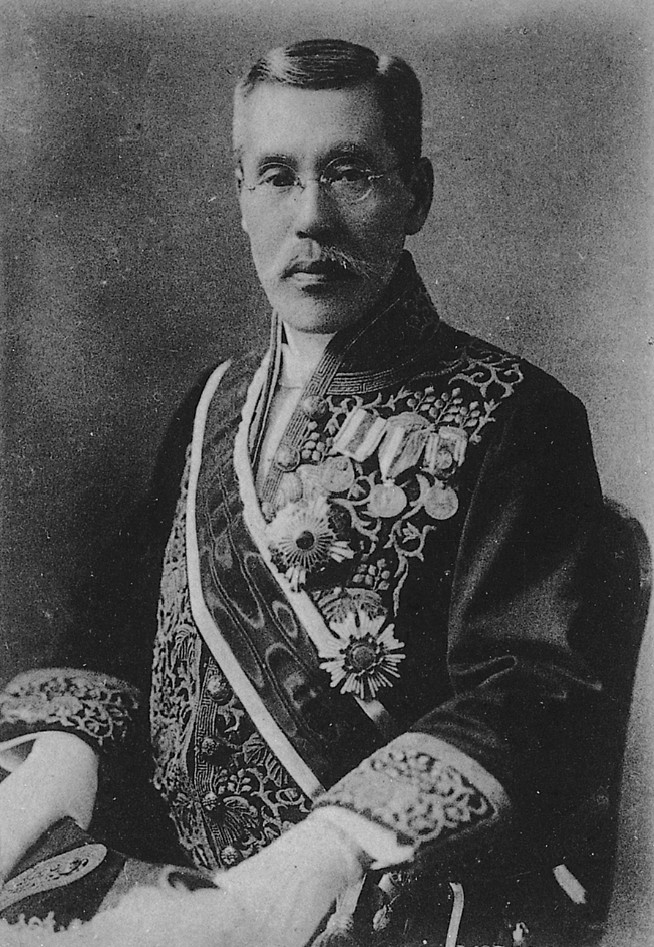Kokuhonsha on:
[Wikipedia]
[Google]
[Amazon]
The was a 
nationalist
Nationalism is an idea and movement that holds that the nation should be congruent with the state. As a movement, nationalism tends to promote the interests of a particular nation (as in a group of people), Smith, Anthony. ''Nationalism: Th ...
political society in late 1920s and early 1930s Japan
Japan ( ja, 日本, or , and formally , ''Nihonkoku'') is an island country in East Asia. It is situated in the northwest Pacific Ocean, and is bordered on the west by the Sea of Japan, while extending from the Sea of Okhotsk in the n ...
.

History
The ''Kokuhonsha'' was founded in 1924 byconservative
Conservatism is a cultural, social, and political philosophy that seeks to promote and to preserve traditional institutions, practices, and values. The central tenets of conservatism may vary in relation to the culture and civilization in ...
Minister of Justice
A justice ministry, ministry of justice, or department of justice is a ministry or other government agency in charge of the administration of justice. The ministry or department is often headed by a minister of justice (minister for justice in a ...
and President of the House of Peers, Kiichirō Hiranuma. It called on Japanese patriots to reject the various foreign political “-isms” (such as socialism
Socialism is a left-wing economic philosophy and movement encompassing a range of economic systems characterized by the dominance of social ownership of the means of production as opposed to private ownership. As a term, it describes th ...
, communism
Communism (from Latin la, communis, lit=common, universal, label=none) is a far-left sociopolitical, philosophical, and economic ideology and current within the socialist movement whose goal is the establishment of a communist society, ...
, Marxism
Marxism is a Left-wing politics, left-wing to Far-left politics, far-left method of socioeconomic analysis that uses a Materialism, materialist interpretation of historical development, better known as historical materialism, to understand S ...
, anarchism
Anarchism is a political philosophy and movement that is skeptical of all justifications for authority and seeks to abolish the institutions it claims maintain unnecessary coercion and hierarchy, typically including, though not neces ...
, etc.) in favor of a rather vaguely defined “Japanese national spirit” (''kokutai
is a concept in the Japanese language translatable as " system of government", "sovereignty", "national identity, essence and character", "national polity; body politic; national entity; basis for the Emperor's sovereignty; Japanese constitu ...
''). The name “''kokuhon''” was selected as an antithesis to the word “''minpon''”, from ''minpon shugi'', the commonly used translation for the word “democracy
Democracy (From grc, δημοκρατία, dēmokratía, ''dēmos'' 'people' and ''kratos'' 'rule') is a form of government in which the people have the authority to deliberate and decide legislation (" direct democracy"), or to choose g ...
”, and the society was openly supportive of totalitarian
Totalitarianism is a form of government and a political system that prohibits all opposition parties, outlaws individual and group opposition to the state and its claims, and exercises an extremely high if not complete degree of control and reg ...
ideology. The elder statesman Saionji Kinmochi
Prince was a Japanese politician and statesman who served as Prime Minister of Japan from 1906 to 1908 and from 1911 to 1912. He was elevated from marquis to prince in 1920. As the last surviving member of Japan's '' genrō,'' he was the most ...
publicly criticized the organization of promoting Japanese fascism.
Membership of the ''Kokuhonsha'' included many of Hiranuma's colleagues from the Ministry of Home Affairs
An interior ministry (sometimes called a ministry of internal affairs or ministry of home affairs) is a government department that is responsible for internal affairs.
Lists of current ministries of internal affairs
Named "ministry"
* Ministry ...
, important businessmen, as well as some of the most powerful generals and admirals, including generals Sadao Araki, Jinzaburō Masaki, Makoto Saitō
is a unisex Japanese name although it is more commonly used by males.
As a noun, Makoto means " sincerity" (誠) or "truth" (真, 眞).
People
Given name
* Makoto (musician) (born 1977), drum and bass artist
*Makoto (Sharan Q) ( まこと), ...
, and Yamakawa Kenjirō with war hero
A hero (feminine: heroine) is a real person or a main fictional character who, in the face of danger, combats adversity through feats of ingenuity, courage, or strength. Like other formerly gender-specific terms (like ''actor''), ''hero' ...
and admiral Tōgō Heihachirō
Marshal-Admiral Marquis , served as a '' gensui'' or admiral of the fleet in the Imperial Japanese Navy and became one of Japan's greatest naval heroes. He claimed descent from Samurai Shijo Kingo, and he was an integral part of preserving ...
serving as honorary Vice Chairman.Sims, Japanese Political History Since the Meiji Renovation 1868-2000, page 182 By 1936, it claimed to have a membership of over 200,000 in 170 branches.Neary, The State and Politics in Japan, page 29 The ''Kokuhonsha'' published a newspaper, and acted as Hiranuma's political support group.
However, after Hiranuma was appointed President of the Privy Council
A privy council is a body that advises the head of state of a state, typically, but not always, in the context of a monarchic government. The word "privy" means "private" or "secret"; thus, a privy council was originally a committee of the mo ...
, he no longer needed the support of a political action group. The February 26 Incident of 1936, during which time many prominent members expressed support for the insurrectionists, provided Hiranuma with an excuse to order the organization dissolved.
See also
* List of Japanese nationalist movements and partiesReferences
* * * *Notes
{{reflist 1924 establishments in Japan 1936 disestablishments in Japan Politics of the Empire of Japan Political organizations based in Japan Japanese nationalism